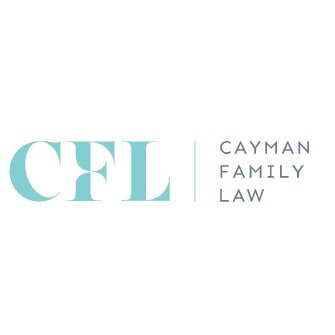Best Child Custody Lawyers in Cayman Islands
Share your needs with us, get contacted by law firms.
Free. Takes 2 min.
Free Guide to Hiring a Family Lawyer
Or refine your search by selecting a city:
List of the best lawyers in Cayman Islands
About Child Custody Law in Cayman Islands:
Child custody in Cayman Islands refers to the legal and practical relationship between a parent and a child. It involves the rights and responsibilities of parents in making decisions for the child's upbringing, including where the child will live and who will have legal custody. In Cayman Islands, child custody matters are taken seriously by the courts, with the best interests of the child being the primary consideration.
Why You May Need a Lawyer:
There are several situations in which you may need a lawyer for child custody matters in Cayman Islands. These could include disputes over custody or visitation rights, issues related to child support, modifications to existing custody arrangements, or enforcement of court orders. A lawyer can provide valuable legal advice, represent you in court, and help navigate the complexities of child custody laws in the Cayman Islands.
Local Laws Overview:
Under Cayman Islands law, the primary consideration in child custody cases is the best interests of the child. The courts will take into account factors such as the child's emotional and physical well-being, the child's wishes (depending on their age and maturity), and the ability of each parent to provide a stable and loving environment. Custody arrangements can be determined through negotiation, mediation, or through court proceedings if necessary.
Frequently Asked Questions:
1. How is child custody determined in the Cayman Islands?
In Cayman Islands, child custody is determined based on the best interests of the child. The court will consider factors such as the child's well-being, the relationship between the child and each parent, and the ability of each parent to provide a stable environment.
2. Can grandparents or other relatives seek custody of a child in Cayman Islands?
Yes, grandparents or other relatives can seek custody of a child in Cayman Islands if it is in the best interests of the child. The court will consider factors such as the relationship between the child and the relative, the wishes of the child, and the ability of the relative to provide for the child's needs.
3. How can I modify an existing child custody arrangement in Cayman Islands?
To modify an existing child custody arrangement in Cayman Islands, you will need to file a petition with the court requesting a modification. You will need to show that there has been a significant change in circumstances that warrants a modification, and that the modification is in the best interests of the child.
4. What rights do non-custodial parents have in Cayman Islands?
Non-custodial parents in Cayman Islands have the right to visitation with their child, unless the court determines that it is not in the best interests of the child. Non-custodial parents also have the right to participate in major decisions about the child's upbringing, such as education and medical care.
5. How is child support determined in Cayman Islands?
Child support in Cayman Islands is determined based on the needs of the child and the financial resources of both parents. The court will take into account factors such as the child's living expenses, the income of each parent, and any special needs of the child.
6. Can a child express their preference for custody in Cayman Islands?
Yes, depending on the child's age and maturity, their preferences for custody may be taken into account by the court. The court will consider the child's wishes, along with other factors, in determining the best interests of the child.
7. How long does a child custody case typically take in Cayman Islands?
The duration of a child custody case in Cayman Islands can vary depending on the complexity of the case and the willingness of the parties to reach a resolution. Some cases can be resolved through negotiation or mediation relatively quickly, while others may require court proceedings and can take longer to resolve.
8. What happens if one parent violates a custody order in Cayman Islands?
If one parent violates a custody order in Cayman Islands, the other parent can seek enforcement of the order through the court. The court may impose penalties on the violating parent, such as fines or changes to the custody arrangement, to ensure compliance with the order.
9. Can I represent myself in a child custody case in Cayman Islands?
While you have the right to represent yourself in a child custody case in Cayman Islands, it is often advisable to seek legal representation. A lawyer can provide valuable guidance and support throughout the legal process, increasing the likelihood of a favorable outcome.
10. What resources are available for parents seeking child custody advice in Cayman Islands?
There are several resources available for parents seeking child custody advice in Cayman Islands, including legal aid services, family support organizations, and online resources. It is important to seek reliable and accurate information to make informed decisions about child custody matters.
Additional Resources:
If you are in need of legal advice or assistance with child custody matters in Cayman Islands, you may consider contacting the Cayman Islands Legal Practitioners Association for a list of qualified family law attorneys. Additionally, the Department of Children and Family Services can provide information and support for families navigating child custody issues.
Next Steps:
If you require legal assistance with child custody matters in Cayman Islands, your first step should be to consult with a qualified family law attorney. They can assess your situation, provide guidance on your legal rights and options, and represent you in court if necessary. It is important to act promptly and seek legal advice to ensure the best possible outcome for you and your child.
Lawzana helps you find the best lawyers and law firms in Cayman Islands through a curated and pre-screened list of qualified legal professionals. Our platform offers rankings and detailed profiles of attorneys and law firms, allowing you to compare based on practice areas, including Child Custody, experience, and client feedback.
Each profile includes a description of the firm's areas of practice, client reviews, team members and partners, year of establishment, spoken languages, office locations, contact information, social media presence, and any published articles or resources. Most firms on our platform speak English and are experienced in both local and international legal matters.
Get a quote from top-rated law firms in Cayman Islands — quickly, securely, and without unnecessary hassle.
Disclaimer:
The information provided on this page is for general informational purposes only and does not constitute legal advice. While we strive to ensure the accuracy and relevance of the content, legal information may change over time, and interpretations of the law can vary. You should always consult with a qualified legal professional for advice specific to your situation.
We disclaim all liability for actions taken or not taken based on the content of this page. If you believe any information is incorrect or outdated, please contact us, and we will review and update it where appropriate.
Browse child custody law firms by city in Cayman Islands
Refine your search by selecting a city.
















